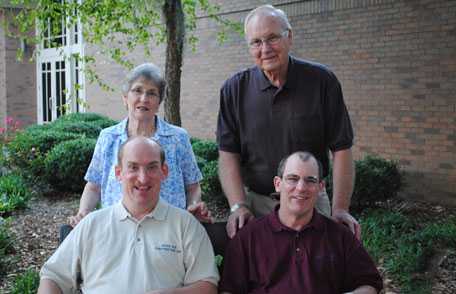It's a Family Thing: Ruth's Story
 Read one family’s story of living with fragile X syndrome and find out what CDC is doing about this condition.
Read one family’s story of living with fragile X syndrome and find out what CDC is doing about this condition.
Ask Ruth what it's been like having two sons with full mutation fragile X syndrome, and she'll tell you. "It's been so hard. But it's changed my life. I love it all. Even the struggles have been strengthening."
Fragile X syndrome (FXS) is the most common known cause of inherited intellectual disability. Males with FXS usually have some degree of intellectual disability which can range from mild to severe and females range from normal intellectual ability to moderate intellectual disability. Individuals with full mutation FXS may also experience a range of behavioral and health challenges from anxiety, depression, sensory issues (problems receiving and responding to sensory information, such as seeing, hearing, smelling, tasting, and touching), and autism, to ear infections, difficulty sleeping, seizures, and gastrointestinal problems like diarrhea and gastric reflux.
A Day in the Life of Fragile X
Ruth's two sons, John and David, are both middle-aged. John is about to turn 50. He's the higher functioning of the two. He's worked for 29 years as a dishwasher at a cafeteria that's walking distance from his home. Ruth recalls the time John's boss asked him to come to work 30 minutes earlier the next day. "They need a face clock. They can see the hands going around, but telling John to come to work earlier the next day doesn't mean anything. John's boss needs to tell me or tell the job coach, and we make the adjustment. We take his clock and put it on the copier with the hands where they need to be for him to leave. Then we copy it and put it up beside his other clock. After one day, he's got it. He knows what it's supposed to look like."
Then there's the time a policewoman picked John up while he was walking to work. She stopped to question him and he ran. When she chased him, he hit her with his gym bag. She locked him in the police car and took him home. Ruth says the officer simply had no idea she was dealing with someone with a disability, nor could the officer have predicted the work Ruth would have to do with John to get him comfortable with police officers again.

Ruth says she would tell parents of younger children with FXS that it does get better.
David, age 47, is John's younger brother. He worked for nine years in the kitchen of an inn before he started having trouble with anxiety. The anxiety developed into a panic disorder and he became unable to work. For a few years, the family never went out of town together. Familiar activities like his day program or going to church were fine, but unfamiliar activities and places would send David into panic mode. These days David does volunteer work as part of a day program. He packs bags with necessities for a battered women's shelter or works in different thrift stores around town. Throughout the day, David is with staff members he knows. Ruth says "he feels secure that whoever is with him is someone who won't push him into a situation he can't handle."
After a lot of waiting and a little luck, John and David now live together with a third roommate in an independent setting. Monday night is grocery shopping, Tuesday is swimming, Wednesday is bowling, Thursday is floor hockey, and Friday is pizza and movie night with their friends. Saturday is dinner out. Every other weekend John and David go home with Ruth and her husband Earl. At each of these activities they have support.
Ruth and Earl raised their sons before there was a diagnosis of fragile X syndrome. Ruth says the school put a lot of pressure on John and David—thinking their challenges were a result of bad behavior—instead of managing the environment so they didn't get anxious and upset. Ruth says if there was one thing she could change for John and David, it would be eliminating that anxiety. She says her sons seldom have meltdowns anymore, but it's that anxiety that hurts their lives.
Ruth and Earl don't talk with John and David about what will happen when they're gone. They know their sons will ask them where they're going and when. Ruth says her sons understand that somebody is going to need to take care of them. She has two nieces that are younger than John and David. The four cousins grew up together. The nieces will step in when Ruth and Earl can't. Ruth says they know they're in training and one of them closely watches what Ruth does when there's a problem, and asks lots of questions.
Ruth says she would tell parents of younger children with FXS that it does get better. She says her sons have gained more control and become more flexible as they've gotten older. It's no longer a catastrophe if their routine changes. "Doors will open. We walk through them and wait for the next one."
What CDC is Doing
The Centers for Disease Control and Prevention (CDC) works with FXS healthcare professionals and researchers to answer important questions about the condition. Very little data currently exists on aging with FXS. The next phase of CDC's FXS research will build on existing activities and focus in part on
- The most common conditions that coincide with FXS across the lifespan;
- What treatments and services are needed by adults with FXS;
- The impact of FXS on individuals and their families;
- Social issues faced by adults with FXS;
- Employment challenges;
- Daily living and functional skills;
- Transitions, such as school to work, or living at home to living independently or in a group setting; and
- Guardianship.
The more we learn about FXS, the more physicians, nurses, and allied health professionals can tailor their care for individuals living with FXS, enabling each person to reach their full potential. For families, a better understanding of FXS means having the tools to find and provide the best care for their loved ones.
More Information
- Page last reviewed: July 13, 2016
- Page last updated: July 13, 2016
- Content source:
Error processing SSI file


 ShareCompartir
ShareCompartir